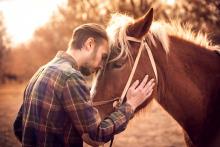The things witnessed and actions taken during military service can lead to posttraumatic stress disorder and other debilitating illnesses.
Retired Command Sgt. Maj. Sam Rhodes, a nearly 30-year U.S. Army veteran, says he was scarred by nightmares of his combat experiences in Iraq upon returning home to Georgia. He also had depression, he says. Yet, Mr. Rhodes missed the camaraderie of his squad and felt lost when he returned home. For a time, he says, ending his life seemed the only way out.
Then he began to care for his stepdaughter’s horse. “Cleaning stalls, putting up fences; it made me feel like I had a purpose in life. It’s amazing how it really got me to calm down a little bit,” he relates in an interview with CNN.
Seeking to share the relief he felt, Mr. Rhodes built his own horse ranch and created Warrior Outreach, a nonprofit that, among other things, provides free access to horses for veterans, service members, and their families through its twice yearly Horsemanship Program. For Mr. Rhodes and the other veterans who frequent the ranch, there has been no miracle turnaround. .
“Guys can come out here, especially if they are having a rough go at it, and just kind of forget about what’s going on in the real world,” veteran Michael Christensen says. “The fact that we can network and just say, ‘Anytime you need something, here’s my number, call me’ ... It builds a network of veterans that can help each other.”
Two perspectives on anorexia
Identical twins often share many of the same interests, but they also can experience differences in how they view themselves.
Take the case of Bridget Yard, an identical twin and journalist who, in a CBC radio report, describes her life with an eating disorder and a twin sister who proved to be her savior.
“I sometimes thought I wouldn’t survive my teenage years, or early adulthood, because of my illness. But once I let Brianna in on my secrets, we began to deal with them together. She continues to be my greatest support as I enter recovery and work hard to live a healthy, full life. But we both still struggle with something. Why did I develop an eating disorder, and not Brianna? We were raised in the same environment, by the same loving parents. Our DNA is identical. I want to know what tipped the balance. Why me?”
The clues were there early on. Bridget was insecure and shy as a teen, and she says she was struggling to accept issues that included her feelings of bisexuality. Brianna was confident and outgoing. Hunger became a way for Bridget to quiet the demons of insecurity and establish some control. “I pushed my sexuality further back into the closet than my eating disorder,” she says. “That closet was full up, and it was killing me to continue the charade.”
Howard Steiger, PhD, tells Bridget Yard that the twin with anorexia nervosa often is found to be more perfectionistic and prone to being concerned with making errors and with others judgments. “Now we don’t know, is that a sort of a life experience thing that causes that to become more expressed? Or is that a secondary thing because of starvation and the effects of malnutrition? Or is it maybe a prenatal effect, that meant that one of the twins was programmed to be a little more perfectionistic than the other?” says Dr. Steiger, director of the Douglas Mental Health University Institute’s Eating Disorders Program at McGill University in Montreal.
Genetic changes, even before birth, might have a role. Whatever the causes, personal acceptance and recognition of her strengths and frailties have helped Bridget find a new path.
“Brianna has a phrase that we use a lot: ‘Nothing to it but to get through it.’ I used to hate that. It’s so cold, and things aren’t always so simple,” Bridget says in the interview. “But now, I embrace it. I know I will never have to do this alone. There’s nothing to it but to get through it – honestly, and together.”


